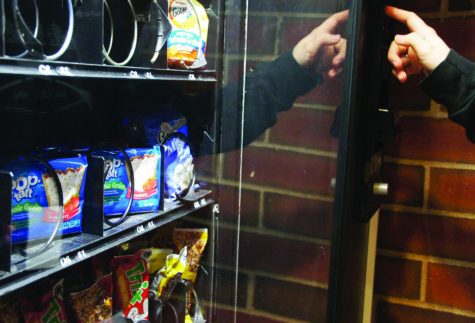Teens glorify eating disorders
December 10, 2019

Students are able to choose what they fuel their body with at lunch time. ‘Smart Snacks’ is a popular food line in the cafeteria that contains a wide selection of snacks.
It is often mistaken that eating disorders result from choice of lifestyle. Eating disorders are classified as an illness rather than a choice. Disordered eating is highly associated with teenagers as teens may suffer from a related illness in high school.
“It’s really a tricky subject to bring up to somebody,” psychology teacher Michael Kaul said. “If you understand the nature of disordered eating, it’s about the messages people receive and if you tell somebody, you look really thin or ‘have you lost a lot of weight?’ they internalize sometimes as ‘I’m fat’, and hear something very different.”
Around 30 million people suffer from an eating disorder in the U.S. There are many illnesses associated with eating disorders, anorexia being the main one. Other common eating disorders include bulimia and binge eating.
“When I think of eating disorders, I think of someone that’s dealing with anorexia because of all the new popular trends in the media with all the skinny, perfect beautiful people that put a lot of pressure on teenagers to look a certain way and can pressure them into thinking they can’t eat,” senior Emma Urban said.
With the stimulation from phones, teenagers are constantly scrolling through their social media feeds and looking at flawless pictures the public puts out there for everyone to see. Looking at pictures of models and fitness trainers for example, has a negative effect on the self esteem and identity of someone who is suffering from an eating disorder.
Kaul said, “There’s a lot of pressure to be what others want us to be.”
These illnesses effect students throughout the school day and come in conflict with their academics and extracurriculars as their grades begin to slip from lack of motivation and loss of focus in class from a shortage of nutrition.
“It got super hard to focus in class because all I was doing was thinking of the foods I could and couldn’t eat,” *Jane Doe said.
Students who have peers suffering from an eating disorder are able to notice symptoms and signs that their friend is suffering.
“I’ll notice a lot they’ll say they’re not hungry or say they already ate when I know they haven’t ate,” Urban said. “I notice they will drink things that make them burn calories faster as well as acting fidgety and nervous and trying to burn any calories.”
An individual who is suffering from an eating disorder may experience significant weight loss, dieting, appear uncomfortable eating around others, skipping meals, consistently checking weight on a scale and making frequent comments about feeling fat.
* Doe said her biggest fear is gaining weight.
Not only do eating disorders effect the sufferers physical and emotional states, but it also effects the chemical imbalance in the brain. Dopamine and serotonin are key chemicals released in the brain that are involved in one’s weight, appetite, and mood. Therefore, low levels of these chemicals in the brain result from eating disorders and effect the person suffering.
*Doe said her eating disorder ruins the chemical balance in her brain from not eating all day.
Students suffering from eating disorders often do not seek help right away. Students suffering may feel guilty and ashamed. The timing is different for each person to when they want to share their experiences and when they choose to seek help. In addition, there is a process students suffering will undergo to get the help they need.
“The right protocol is students talk to other students and the student talks to another teacher who then refers the student to their counselor,” Kaul said. “Sometimes I can make a referral directly to the Wellness Center.”
The Wellness Center is a place where students suffering from an eating disorder can get help. The Wellness Center encourages students to improve their health, make healthy lifestyle choices, and to improve their overall well-being. However, students suffering feel more comfortable sharing their experiences with their peers as teachers and administrators may be intimidating.
Urban said, “I don’t think students suffering seek help during school because I think they don’t feel as comfortable with teachers as they would with their friends.”
Students who suffer from eating disorders may undergo a loss of motivation in school and have a chemical imbalance in the brain due to lack of nutrition. Students suffering are able to seek help from teachers and their peers in school when they feel ready to share their story and experience.
“People share when they’re ready for something to change on an emotional level, and when they want change, they’re unhappy with who they are,” said Kaul.
*Name has been changed to protect the identity of the source.












Hnubtsa Yang • Feb 5, 2020 at 8:33 pm
This was a very powerful article. It’s a very sensitive topic, the way it was approached was professional. The quotes were meaningful and so was having a source who has experienced it first hand. Facts were very informative and important to know and understand. Really respected how Jane Doe’s identity was protected. Overall, amazing job.
Mairin Torgerson • Dec 17, 2019 at 10:05 pm
This article was super informative and I liked how you interviewed a student who actually has an eating disorder to get an insider’s view on the situation. You also included a lot of facts that readers most likely would not know about eating disorders which made the article easy to read. It also had a clear angle as students can relate to this because we are the people who are usually affected by things like eating disorders.
Natalie Williams • Dec 14, 2019 at 3:09 pm
This article covered a very intense subject, but did so in a very respectful way. I loved how you interviewed someone with first hand experience because it adds to the reality of the article. This article told the reality of how some people think of themselves, and I believe it will definitely open students eyes. Overall, I think you did a very good job on this article!
Elle Guggenberger • Dec 10, 2019 at 8:12 pm
I really like that you interviewed someone who could add a firsthand perspective while also protecting their identity. This interview makes the story much more informative and I think it could actually help many people become aware of the thoughts feelings and actions of one with an eating disorder. I also love that you added a paragraph dedicated to the Wellness Center. That isn’t something that I think is very widely known, so I think spreading awareness that we have the program in our school could be really beneficial to many people.